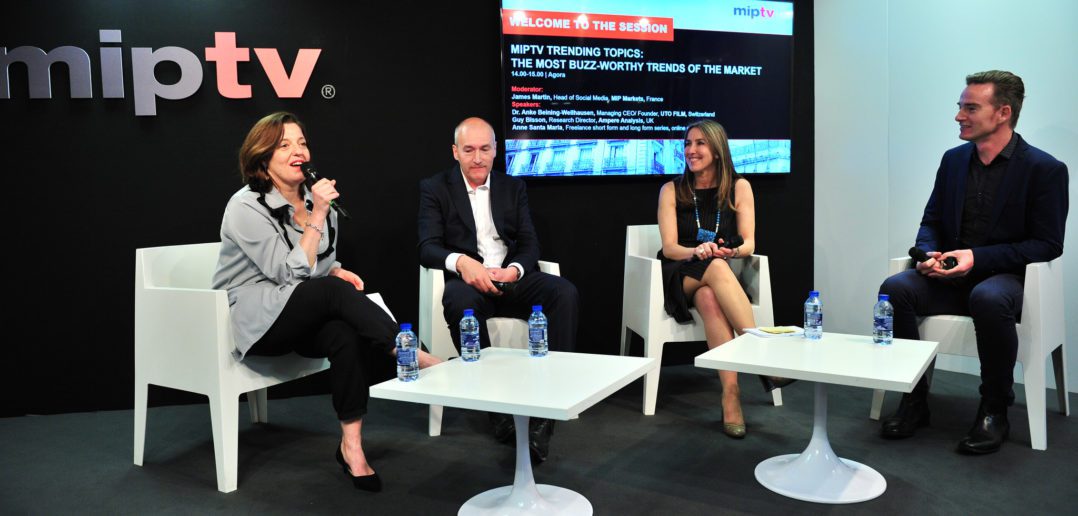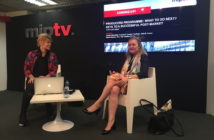What were the buzziest topics of this week? Here to go over the market’s highs and lows, MIP Markets‘ Head of Social Media, James Martin (far right) hosted a panel of attendees and industry experts, including Consultant Anne Santa Maria (far left), Guy Bisson, Ampere Analysis Research Director; and Director/Founder Dr. Anke Beining-Wellhausen of UTO Film.
As always, we kicked off with the biggest buzzwords that came out on social media, based on Twitter hashtag mentions and our most-read MIPBlog conference reports:
#braveandbeautiful #eternal
“Something incredible happened, something I’ve never seen before, during this MIPTV,” Martin began. “Turkish TV fans are incredibly active on social… and not just in Turkey. 21 of the top 50 hashtags around MIPTV this week were to do with Turkish drama, mainly around 2 shows: Brave and Beautiful, and Eternal, which Global Agency brought here and screened.”
He explained that fans of Eternal and of its star, Engin Akyürek, organised a global campaign whereby they tweeted about Eternal from all over the world, Martin said. “It completely dominated social conversations, demonstrating the power of fans.”
He also pointed out that Global Agency had received purchase interest for Eternal from several countries this week, including a potential US remake.
#MIPDrama
This hashtag was driven by the second annual MIPDrama screenings and the Pre-LA screenings. Notably, Martin pointed to innovations like a competition-style game show adaptation of the mobile game Candy Crush Saga, announced at the latter (though it isn’t a drama).
Lionsgate Television‘s President of International Television and Digital Distribution, Peter Iacono, described it thus: “Each game board is going to be seven metres across and 10 metres high, and it’s going to be physical challenges as well as doing the classic swipes of the game.”
Panelists also seized this moment to share dramas they look forward to, with Santa Maria citing French series 10 Percent, Beining-Wellhausen touting Italy’s Waiting for Zipporah and Germany’s Babylon Berlin, and Bisson talking about the “maternity noir” category of shows from Fresh TV, exemplified in SPTI’s The Replacement.
Other buzzworthy terms included #marykillspeople, for the show of the same name (actress Caroline Dhavernas walked the red carpet for it this week), #freshTV—our Fresh TV blog reports scored No. 2 (Formats) and 3 (Factual) in total views, with MTV UK’s Spring Break with Grandad winning a special place in people’s hearts—and #cannesseries.
The latter is for the Cannes Series festival, slated to be launched by the City of Cannes in April 2018 alongside MIPTV, and with which we will be sharing a co-production summit. Fleur Pellerin, France’s former culture minister, will be President of Series.
Next there was #digital, driven by talk of the MIP Digital Fronts, especially Jukin Media’s Dunking Devils performance:
.@JukinMedia @PAAVideos @JoshEntman @JonSkogmo And here’s a video of @JukinMedia‘s @PAAVideos Fly Guys team in action at #MIPTV pic.twitter.com/xhW70FLWp5
— MIP Markets (@mip) April 3, 2017
There was also a lot of talk about Generation Z during the Digital Fronts, particularly by Zoomin Studios and AwesomenessTV.
“Gen Z are the true digital natives,” Beining-Wellhausen marveled. “The second screen, it’s their first screen.”
This drove Martin to ask whether we’ve all forgotten about millennials. Earlier on, Bisson attributed the dominance of Turkish drama to Turkey’s own massive millennial population. Here, however, he was playfully resigned.
“The oldest millennials are now in their mid-30s,” said Bisson. “Once you hit 39, you’re completely ignored, as anyone over 39 will tell you. So yes, Gen Z will be the next hot topic.”
And of course there was #VR.
Beining-Wellhausen, who’d been a panelist for Tuesday’s VR Entertainment for Kids session, talked about the pleasure she had in trying Turner’s Adventure Time experience.
But she also pointed to VR’s challenges. “No one has figured out how to make money with it and bring it to the mass audience, the home” she said, not to mention the cost of hardware and age limitations: For kids content, “some [experiences]have age limitations of 12 years old, and actually the most interesting target group is under 12.”
She did observe that Google Cardboard was a good first entry device, but “to have full immersion and the best experience, you need a proper device; and there are several out there.”
In the end, it will come down to storytelling. “Everybody is fascinated” by the storytelling potential, Beining-Wellhausen said, and Martin rejoindered with a quote heard this week about having to think about VR production as if it is theatre.
“There are 5 years of conference sessions on a topic before it becomes a mass market reality,” said Bisson. “In the case of VR, we’re looking at a 5- to 10-year timeline before it becomes a significant subset of entertainment … but I was completely negative about 3D; I am bullish about VR.”
He explained, “What I saw at MIP is that content creators finally caught on that VR is not about viewing; it’s about experience.”
Santa Maria was less bullish. “It’s very hard to tell a story when you are the character yourself,” she said. “The writers are not ready. Few know how to write [for VR],” adding that VR production also costs a lot of money. “I think feature film people with massive investment will be quicker than original creators or TV” at mastering the art of writing for the medium.
Next, we moved onto the most resonant topics for each panelist.
In Beining-Wellhausen‘s case, it was “augmented creativity,” an expression she heard this week and immediately latched onto and described as the “digital world enhancing traditional activities with AR software. Huge potential there.”
Martin suggested Pokémon Go may be a good example of this. What’s more, nobody called it “augmented reality”; they simply didn’t care because the game was the star.
“Forget the labeling,” Beining-Wellhausen agreed. “Who’d have thought people would love sight-seeing? I saw tons of people running around Zurich chasing Pokémon.”
Building on that, Bisson cited Snapchat Spectacles or live videostreaming. “Think about the problem that exists today with ad breaks in content, then think about overlaying AR advertising [in a real-life environment]without the need for ad breaks… and I think you’ve got a future model for funding, while also getting around that problem of the younger generation being less experienced with breaks in their programming.”
“I’m waiting for mixed reality, when the Pokémon answers the question you ask and not what the game wants,” said Santa Maria, speculating that she could watch George Clooney cleaning her room, and they could, well… interact. “It’s too far ahead, we don’t have that technology yet… Maybe in 10 years time, you can have your hero in your room and they’ll be your best confidant or love interest.”
Bisson’s topic was “Localised Globalisation,” or the internationalisation of local drama.
“2-5 years ago, if you made a German language drama, you were pretty much guaranteeing that it would only show in Germany, or it would be shown in early hours when nobody would see it,” said Bisson. Now you have German shows with international clout, like Deutschland 83 or Babylon Berlin.
“Scripted drama’s bubble has yet to burst, and demand for scripted drama seems to be getting ever stronger. Part of that is because of global platforms presented by Netflix and Amazon,” he explained. “They need to increasingly localise and are giving [international]potential to non-English language drama that simply didn’t exist before.”
Of course, Germany isn’t the only recipient of these fruits. Of course there is Turkey. And when TF1’s Gilles Pelisson received Variety’s 2017 Achievement in TV award this week, he also touted TF1’s international ambitions for French content. Beining-Wellhausen also expressed excitement for Italian series Gomorra, and Santa Maria pointed to French series Midnight Sun, where characters speak multiple languages—another increasingly common sight.
“It could not be more timely,” said Bisson. “I think as my country, the UK, puts up barriers with Brexit, and the US is literally putting up walls as well as ideological barriers, exposing the global audience to Russian or Chinese-language drama [shows them]that the experience of being human is not a national experience … And that’s more important than ever in the current political climate. TV can do good.”
“I like the notion of TV fighting Brexit and Trump,” James agreed. “But it is a really interesting trend … I don’t think people are bothered by subtitles anymore.” He observed that France is among many major countries where international television is traditionally dubbed, and preferred that way. It is less the case now.
To this point, Santa Maria later observed that on Facebook, videos are usually subtitled because they’re usually just watched in autoplay (without clicking on them to activate the sound), meaning Generation Z is more accustomed to reading on-screen text.
“80 percent of videos on mobile are watched without sound,” Martin agreed. “Maybe that’s another subtrend: This generaiton is coming up completely used to subtitles!”
Lastly, Santa Maria presented her topic: “Short-Form to Long-Form,” referring to how short-form content, usually made for digital, is increasingly repurposed in long-form formats. Consider Broad City, which was a web series before Comedy Central picked it up. HBO’s Insecure and High Maintenance were born in the same way.
“It’s another way of consuming fiction in big stories,” said Santa Maria, who added that premium short-form content has also created away to film overseas for less money.
“When you wanted to produce and film abroad, it was expensive; you had to have a coproducer,” she said. “But with short form, you can go to these places. It’s less budget—premium is 1M€ for 100 minutes—so there are quicker ways to produce and have a premium prod value in storytelling.” She pointed to Canal+ app Studio+, which releases a new short-form series every week, many of which aren’t filmed in France.
“It’s the same as when you adapt a book, then it becomes a show. Now web series are a way to scout and source new talent and types of narratives,” said Santa Maria. She added that France is lucky in the sense that its broadcasters already had primetime slates for short form content (such as for Canal+’s 2011-2012 short-form hit Bref). “In the US, you didn’t know where to put it,” she said.
That about wraps it up for this year. See you at MIPCOM on the Croisette!
Watch this, and 30 other MIPTV, MIP Drama Screenings, MIPDoc & MIPFormats sessions in full, here:
And check out the session’s slides here. Thanks for following!




